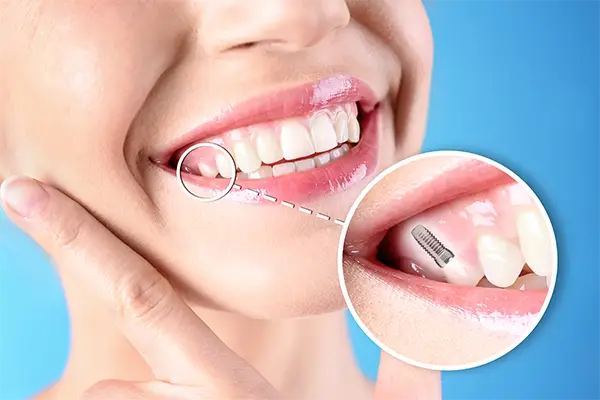What Can Be Done to Reduce the Chances of Implant Rejection?
Posted on 7/1/2025 by Strongsville Center for Cosmetic & Implant Dentistry |
 Dental implants are a popular and effective option for replacing missing teeth. They offer a number of advantages over traditional bridges and dentures, including improved appearance, function, and comfort. However, like any medical procedure, there is a small risk of implant rejection. Dental implants are a popular and effective option for replacing missing teeth. They offer a number of advantages over traditional bridges and dentures, including improved appearance, function, and comfort. However, like any medical procedure, there is a small risk of implant rejection.
In this article, we will discuss what dental implants are and how they work. We will also cover the factors that can increase the risk of implant rejection, and what you can do to reduce your chances of experiencing this complication.
What Are Dental Implants?
A dental implant is a small, screw-like device that is surgically placed into the jawbone. The implant acts as a replacement for the root of a missing tooth. Over time, the implant fuses with the jawbone, creating a strong and stable foundation for a new tooth.
A dental implant is typically made of titanium, a biocompatible material that is well-tolerated by the body. Once the implant is in place, a crown or other type of restoration is attached to the top of the implant. This restoration will look and function like a natural tooth.
How Do Dental Implants Work?
The process of getting a dental implant typically involves several steps. First, the dentist will surgically place the implant into the jawbone. The implant will then be allowed to heal and fuse with the bone for several months. Once the implant has healed, the dentist will attach a small post, called an abutment, to the top of the implant. The crown or other restoration will then be attached to the abutment.
What are the Factors that Increase the Risk of Implant Rejection?
Several factors can increase the risk of implant rejection, including:
| • |
Poor oral hygiene: If you do not practice good oral hygiene, you are more likely to develop an infection around the implant, which can lead to rejection. |
| • |
Smoking: Smoking can interfere with the healing process and increase the risk of infection. It can also decrease blood flow to the implant site, which can make it more difficult for the implant to fuse with the bone. |
| • |
Underlying medical conditions: Some underlying medical conditions, such as diabetes and osteoporosis, can increase the risk of implant rejection. |
| • |
Inadequate bone density: If you do not have enough bone density, the implant may not be able to fuse with the bone properly. This can increase the risk of rejection. |
What Can You Do to Reduce Your Chances of Implant Rejection?
There are several things you can do to reduce your chances of implant rejection, including:
| • |
Practice good oral hygiene: Brush your teeth twice a day and floss daily. You should also see your dentist for regular checkups and cleanings. |
| • |
Quit smoking: If you smoke, quit before you get dental implants. Smoking can interfere with the healing process and increase the risk of infection. |
| • |
Treat underlying medical conditions: If you have any underlying medical conditions, be sure to treat them properly before you get dental implants. |
| • |
Choose an experienced dentist: Choose a dentist who is experienced in placing dental implants. This will help ensure that the procedure is performed correctly and that you have a lower risk of complications. |
Conclusion
Dental implants are a safe and effective option for replacing missing teeth. However, there is a small risk of implant rejection. By following the tips in this article, you can reduce your chances of experiencing this complication. If you are considering getting dental implants, be sure to talk to your dentist about the risks and benefits of the procedure.
|
|
